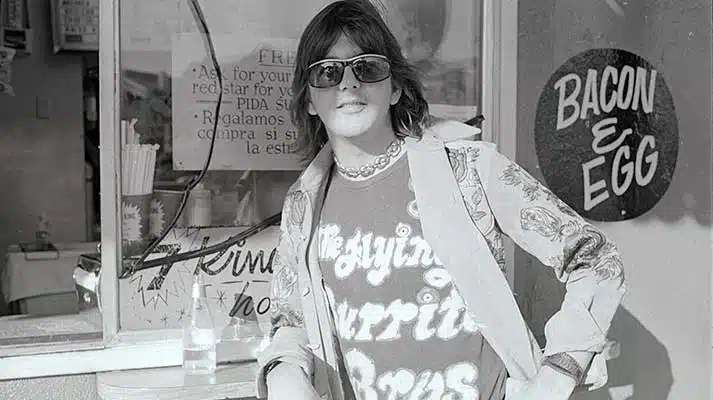Gram Parsons | Alcohol & Morphine Overdose Death
- How Gram Parsons Died
- About Gram Parsons
- History Of Substance Abuse
- Did Gram Parsons Attend Addiction Treatment?
- Recovery Is Possible

Gram Parsons was a pianist, guitarist, and singer-songwriter who was known for being a member of several bands, including The Flying Burrito Brothers, The International Submarine Band, and The Byrds, as well as his solo recordings.
Parsons died at the age of 26 of an alcohol and morphine overdose.
How Gram Parsons Died
On September 19, 1973, Gram Parsons died at the Joshua Tree Inn, located in Joshua Tree National Park, just hours away from Los Angeles, California. The cause of death was ruled an alcohol and morphine overdose.
Frequently visiting the Joshua Tree National Monument with his friends, Parsons was at Joshua Tree the night of his death with Margaret Fisher and Dale McElroy. There were multiple attempts to resuscitate Parsons, none of which were successful.
Parsons was taken to the Yucca Valley hospital where he was pronounced dead. The official cause of death was an overdose caused by the combination of excessive alcohol consumption with morphine.
Controversy Surrounding Parsons’ Body
According to Rolling Stone, Parsons’ body was stolen by his road manager Phil Kaufman and roadie Michael Martin who wanted to comply with Parsons’ wishes by cremating the dead body at Cap Rock in Joshua Tree.
Kaufman drove a hearse to pick up and steal the body at Los Angeles international airport, taking it to Joshua Tree. Once there, Kaufman and Martin attempted the cremation process by putting gasoline on the coffin and setting the body on fire.
Although partially burned, Parsons’ family brought his body to Louisiana. Parsons was finally laid to rest in New Orleans at the Garden of Memories Cemetery.
About Gram Parsons
Gram Parsons was born in Winter Haven, Florida on November 5, 1946. He attended Winter Haven High School, but failed during his junior year and attended Bolles School in Jacksonville, Florida.
Parsons experienced trauma at an early age as his parents participated in alcohol abuse and suffered from depression. When Gram was only 12 years old, his father died by suicide just two days before Christmas in 1958.
Although Parsons’ mother remarried, the drinking continued and Parsons’ mother passed away from cirrhosis caused by heavy drinking on Gram’s graduation day at Bolles school.
Despite the mental illness and substance abuse within his family, Parsons moved forward and poured his passions into music. Parsons attended an Elvis Presley concert in Waycross, leaving him with the inspiration of becoming a rock star.
Music Career
Parsons began playing with cover bands and eventually formed a group known as The International Submarine Band. Parsons later moved to Los Angeles and joined the band The Byrds at the suggestion of the band’s bassist Chris Hillman.
With The Byrds, the country rock album Sweetheart of the Rodeo was recorded.
Later, Parsons and Hillman joined together to form The Flying Burrito Brothers featuring sounds of cosmic American music. While in England, Parsons spent time with Keith Richards, refusing to visit South Africa during the world tour with The Flying Burrito Brothers.
Later in his life during his solo career, Parsons worked with Emmylou Harris. Parsons toured across the United States with a number of other musicians and artists.
Posthumously, Parsons’ solo album Grievous Angel landed on the Billboard 200 charts.
Gram Parsons’ History Of Substance Abuse
Throughout his life, Parsons struggled with substance abuse. In fact, during his time with The Flying Burrito Brothers, his drug use escalated, leading to fewer songs written and performed by the artist.
Parsons’ manager Kaufman helped him maintain sobriety, even removing drug access from Parsons. However, later in his solo career, much of his work sessions were consumed by drugs such as heroin and cocaine.
Parsons would partake in binge drinking, eventually combining other drugs as well.
Did Gram Parsons Attend Addiction Treatment?
In 1971, Parsons received treatment for heroin addiction. Afterward, Parsons stopped taking the drug, but treatment ultimately proved unsuccessful.
Recovery Is Possible
Gram Parsons’ death serves as a reminder that trauma can lead to mental health issues and substance abuse.
However, recovery is possible, even if you struggle with co-occurring mental illness and drug use. Dual diagnosis programs are designed to address both mental health issues at the same time, and work best in inpatient treatment settings.
For information on how we address mental health and substance use disorders, please contact Ark Behavioral Health today.
Written by Ark Behavioral Health Editorial Team
©2024 Ark National Holdings, LLC. | All Rights Reserved.
This page does not provide medical advice.
History - Country-Rock Pioneer Gram Parsons Dies
NPR - You've Never Heard Gram Parsons' 'Grievous Angel'?!
Orlando Sentinel - Infamous Angel
Rolling Stone - Flashback: Gram Parsons Dies in the Desert

Questions About Treatment?
Ark Behavioral Health offers 100% confidential substance abuse assessment and treatment placement tailored to your individual needs. Achieve long-term recovery.
100% confidential. We respect your privacy.
Prefer Texting?
Our friendly support team is here to chat 24/7. Opt out any time.







 Learn More
Learn More








